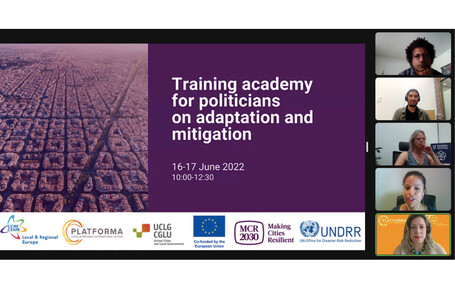
CEMR/PLATFORMA together with United Cities and Local Government, UCLG and Making Cities Resilient 2030 (MCR2030) initiative organized two training sessions for politicians dedicated to climate adaptation and mitigation. The aim of the training academy was to inspire politicians to develop their strategies, plans and actions through the discussion about climate change adaptation, mitigation and resilience in the global and Europe and Central Asia specific context. We counted on over 120 participants world wide.
The first day was opened by Eva Baños de Guisasola, advisor on SDGs, global agendas and climate at PLATFORMA, who highlighted the need for this type of training, for a wide public, and involving politicians and city officials and stakholders in order to learn from each to combat climate change and adapt to it. This first day had a focused on resilience. In her opening remarks Ms. Marlène Siméon, Director of operations, CEMR, highlighted the need for partnerships in order to combat climate change and adapt to it.
After her welcome words the keynote presentation was delivered by Dr. Jaroslav Mysiak, Director of the research division Risk Assessment and Adaptation Strategies (RAAS) of the Euro-Mediterranean Centre on Climate Change. He explained various topics related to climate change adaption, how it is positioned in the global and regional/European frameworks and policy agendas, as well as available knowledge sources supporting the adaptation planning at various levels. He introduced in detail the EU research & innovation mission Adaptation to climate change.
Ronan Dantec, Senator of Loire Atlantique and CEMR Spokesperson on climate confirmed that “We cannot use the same narrative when we deal with climate change, we need indicators so global challenge arnd local response can become closer.
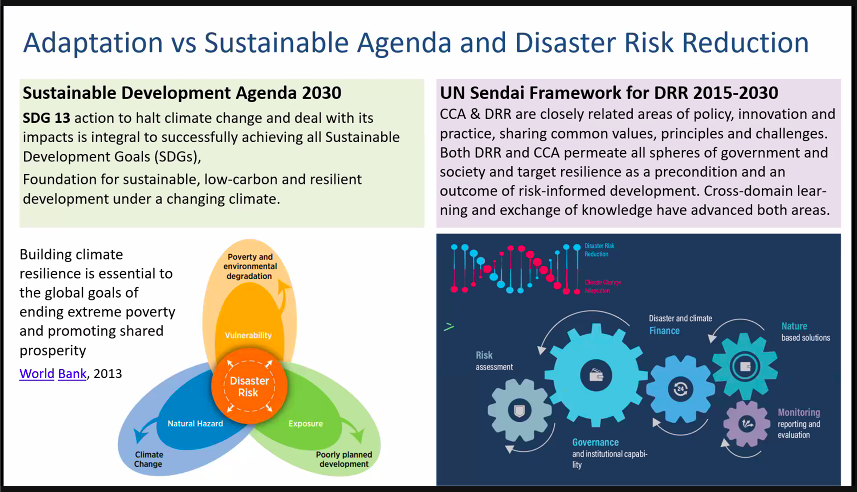
The participants learned about the Making Cities Resilient 2030 (MCR2030) initiative, 2 resilience Hubs. Mr. Magnus Qvant, Senior Strategist from Malmo shared the city’s experience with nature-based solution and how they fit into resilience-building. City of Malmo became a Resilience Hub to share their expertise, collaborate with other cities on creating a financial platform that will work in climate change adaptation. Mr. Alessandro Attolico, Head of Resilience from the Province of Potenza, explained how the Province of Potenza collects data to assess risks which feeds into the strategic action regional plan, which includes different themes related to sustainable development and disaster risk reduction.
The following discussion allowed to understand the mobilization of key actors and department, the change of local policies for long term responses, and the cooperation between government levels and scientific institutions.
Marianne Overton, CEMR spokesperson on environment concluded the day with positive words: “Adaptation means being more resilient against climate change, resilient against covid and war. Thanks to the organisers, speakers and contributors for a host of inspiring speakers and discussions, backed with solid data, giving us the tools to implement the dramatic mitigation and adaptation needed right now”.
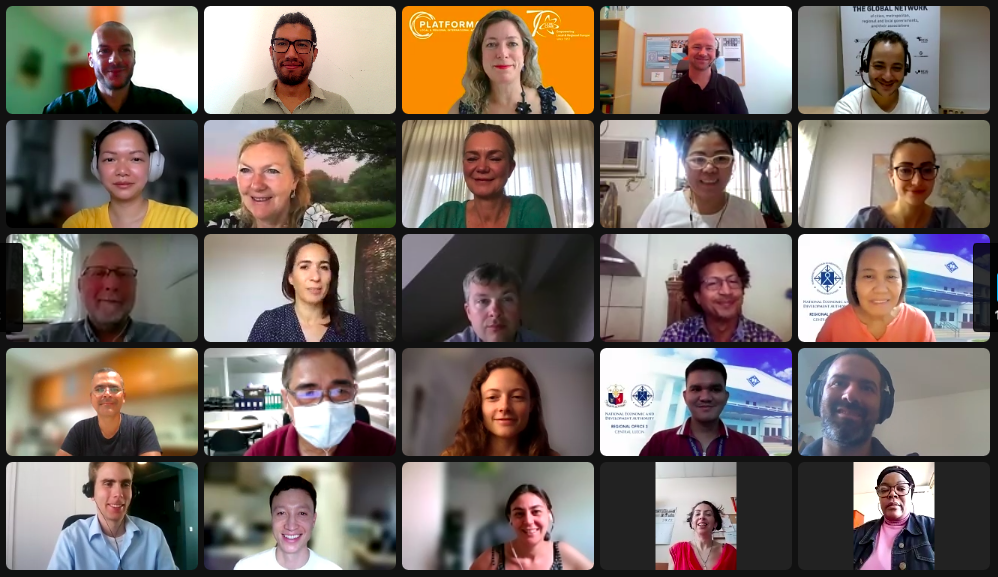
The second day the discussions focused on climate change mitigation. Mr. Fabrizio Rossi, Secretary-General, CEMR, referred to the fact that in Europe, nearly 73% of the population live in urban areas and this is projected to increase to over 80% by 2050. Climate change affects almost all components of cities – their environment, economy and society. And this raises new, complex challenges for urban planning and management.
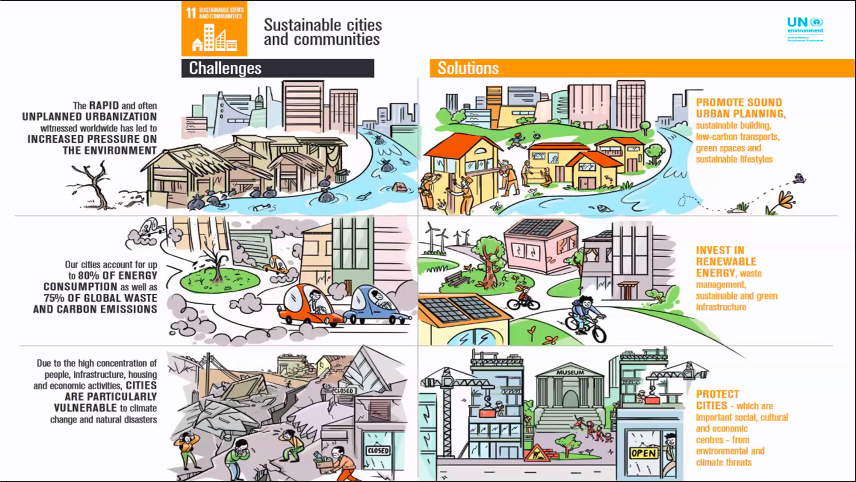
Dr. Kes McCormick, Associate Professor. International Institute for Industrial Environmental Economics (IIIEE) Lund University, Sweden, and the key speaker of the second day, gave an overview of current GHG emissions and possible scenarios for reducing GHG emissions, challenges and opportunities for sustainable cities, and the IPCC summary for urban policymakers among others.
On the first day, Participants also engaged in an interactive game Renaturing Pathways facilitated by Mr. Juan Carlos Uribe Vega, Learning officer at UCLG. The goal of the game was to familiarize participants with some of the many Nature-based Solutions available which can support climate adaptation and/or mitigation efforts. On the second day, a role-playing game – Futurilities – fostered reflection on local decision-making processes and the importance of investing in climate adaptation and resilience. The games are part of the Resilience Learning Modules (training of trainers’ guides) developed by UCLG, UNDRR and UN-Habitat as contribution to the MCR2030 initiative.
Finally, the participants received information about financing climate change adaptation and learned about different financial mechanisms which can provide support to cities. The trainees learned about the technical assistance program to support Cities and Regions on climate change adaptation offered by the Covenant of Mayors for Climate and Energy. In addition, Ms. Constance Kann, Sustainability and Quality Management Director, European Investment Bank presented how this Bank is helping to implement the EU’s Green Deal and Paris Agreement. Ms. Priscilla Negreiros, Manager, Cities Climate Finance Leadership Alliance, shared information about sources and opportunities for climate action funding in Europe. Finally, Ms. Paloma Labbé presented the UCLG Observatory on Local Finances, which includes information about local finance and governance challenges for climate change and resilience.
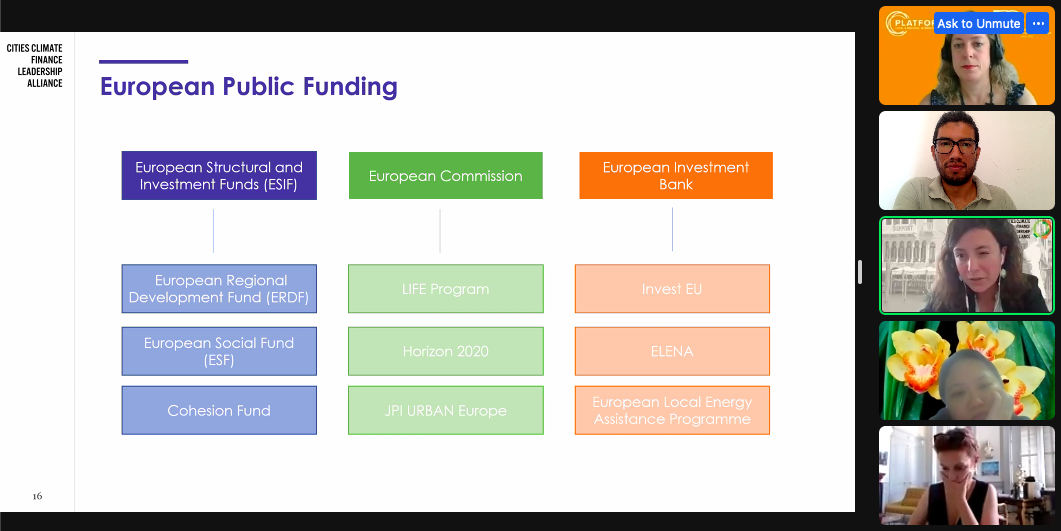
Léonore Monthcond’huy, Mayor of Poitiers, member of Cities Unies France and of PLATFORMA and UCLG concluded the training with a word of hope “Let us come to COP27 with full commitment at the local level”.
Sara Hoeflich, director of UCLG Learning closed the training highlighting the coordination and cocreation effort between the institutions. She announced further activities and opportunities for participants to deepen their knowledge, including through the self-paced online courses that UCLG and its members have developed at learningwith.uclg.org
For more information about the training and to watch the recording of the sessions, please click here. The materials of the training are available here.
For more information, please contact:
1. Eva Baños de Guisasola, Adviser – Global agendas, Sustainable Development Goals and Climate, Council of European Municipalities and Regions/PLATFORMA [email protected]
2. Helena Monteiro, Coordinator of MCR2030 Europe and Central Asia: [email protected]
3. Juan Carlos Uribe Vega, UCLG Learning, [email protected]










